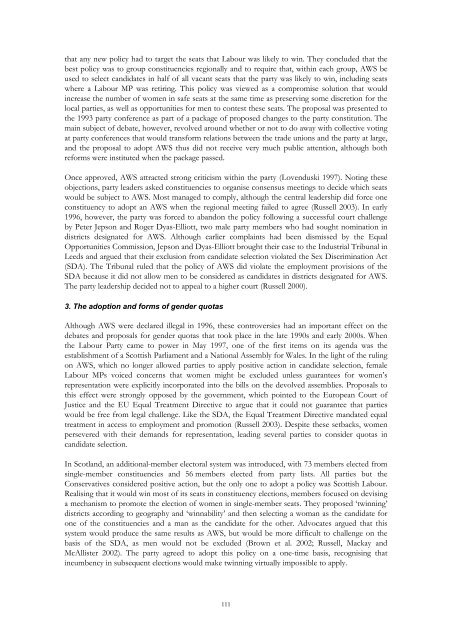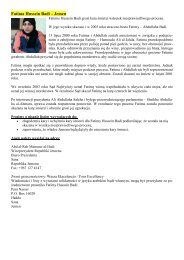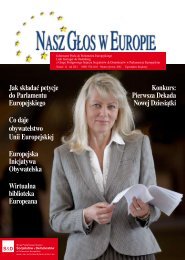Case studyThe United K<strong>in</strong>gdom: political parties <strong>and</strong> quota reformMona Lena Krook1. Overview <strong>and</strong> summaryCampaigns for <strong>gender</strong> <strong>quotas</strong> <strong>in</strong> the United K<strong>in</strong>gdom go back more than 20 years. In the light ofthe FPTP electoral system, quota strategies have focused on the composition of c<strong>and</strong>idateshortlists, the f<strong>in</strong>al lists of c<strong>and</strong>idates be<strong>in</strong>g considered <strong>in</strong> each s<strong>in</strong>gle-member electoral district. In1993, the Labour Party adopted the most controversial of these policies <strong>in</strong> the form of all-womenshortlists (AWS), which required certa<strong>in</strong> districts to consider shortlists consist<strong>in</strong>g entirely ofwomen. When an <strong>in</strong>dustrial tribunal declared this policy illegal <strong>in</strong> 1996, activists devised other <strong>quotas</strong>trategies, known as ‘tw<strong>in</strong>n<strong>in</strong>g’ <strong>and</strong> ‘zipp<strong>in</strong>g’, <strong>in</strong> the run-up to elections for the new devolvedassemblies <strong>in</strong> Scotl<strong>and</strong> <strong>and</strong> Wales <strong>in</strong> the late 1990s. In 2002, the Sex Discrim<strong>in</strong>ation Act wasamended <strong>and</strong> AWS were re<strong>in</strong>troduced.2. Historical background <strong>and</strong> <strong>gender</strong> quota debatesThe policies of all-women shortlists, tw<strong>in</strong>n<strong>in</strong>g <strong>and</strong> zipp<strong>in</strong>g grew out of earlier efforts to get partiesto select more female c<strong>and</strong>idates. The first party to pass a measure was the Social Democratic Party.In 1981, its party congress approved a resolution that at least one woman be <strong>in</strong>cluded on everyc<strong>and</strong>idate shortlist. This was then <strong>in</strong>creased to at least two women per shortlist <strong>in</strong> the run-up toelections <strong>in</strong> 1983. Two years later, the Liberal Party passed a similar resolution that at least onewoman be <strong>in</strong>cluded on every c<strong>and</strong>idate shortlist. When the two parties merged to form the LiberalDemocrats <strong>in</strong> 1988, they agreed to reta<strong>in</strong> the policy of at least one woman per shortlist.The Labour Party first established a goal to nom<strong>in</strong>ate more female c<strong>and</strong>idates <strong>in</strong> 1987, when itdecided that <strong>in</strong> electoral districts where women’s names had been suggested, at least one womanhad to be <strong>in</strong>cluded on the shortlist. In 1989, the party conference approved Composite 54,accept<strong>in</strong>g that <strong>quotas</strong> were the only way to ensure equal representation at all levels of the party. Yet,despite support for <strong>quotas</strong> for <strong>in</strong>ternal party positions, delegates strongly opposed the use of <strong>quotas</strong>for the selection of c<strong>and</strong>idates to Parliament (Russell 2003). In contrast, the Conservative Party didnot consider any proposals to nom<strong>in</strong>ate more female c<strong>and</strong>idates dur<strong>in</strong>g this period. At a more<strong>in</strong>formal level, the party nonetheless sought to <strong>in</strong>clude at least 10 per cent women on its approvedlist of c<strong>and</strong>idates.Around this time, Labour women learned about <strong>gender</strong> <strong>quotas</strong> <strong>in</strong> other socialist <strong>and</strong> socialdemocratic parties across <strong>Europe</strong> (Short 1996). They distributed a pamphlet at the party conference<strong>in</strong> 1990, stress<strong>in</strong>g the need for AWS for the selection of c<strong>and</strong>idates to Parliament. In response, theconference agreed to a 40 per cent quota for women <strong>in</strong> positions <strong>in</strong>side the party <strong>and</strong> a target of50 per cent women among the party’s MPs with<strong>in</strong> ten years or three general elections. Although theparty leadership urged local parties to adopt AWS, most parties had already selected <strong>their</strong>c<strong>and</strong>idates, <strong>and</strong> thus only one AWS was considered before the 1992 elections (Eagle <strong>and</strong>Lovenduski 1998). While the party did nom<strong>in</strong>ate more women, most of them were placed <strong>in</strong>unw<strong>in</strong>nable seats (Russell 2003: 69).After the party’s loss to the Conservatives, research suggested that a means of exp<strong>and</strong><strong>in</strong>g supportamong female voters was to nom<strong>in</strong>ate more female c<strong>and</strong>idates. Women <strong>in</strong>side the party stressed110
that any new policy had to target the seats that Labour was likely to w<strong>in</strong>. They concluded that thebest policy was to group constituencies regionally <strong>and</strong> to require that, with<strong>in</strong> each group, AWS beused to select c<strong>and</strong>idates <strong>in</strong> half of all vacant seats that the party was likely to w<strong>in</strong>, <strong>in</strong>clud<strong>in</strong>g seatswhere a Labour MP was retir<strong>in</strong>g. This policy was viewed as a compromise solution that would<strong>in</strong>crease the number of women <strong>in</strong> safe seats at the same time as preserv<strong>in</strong>g some discretion for thelocal parties, as well as opportunities for men to contest these seats. The proposal was presented tothe 1993 party conference as part of a package of proposed changes to the party constitution. Thema<strong>in</strong> subject of debate, however, revolved around whether or not to do away with collective vot<strong>in</strong>gat party conferences that would transform relations between the trade unions <strong>and</strong> the party at large,<strong>and</strong> the proposal to adopt AWS thus did not receive very much public attention, although bothreforms were <strong>in</strong>stituted when the package passed.Once approved, AWS attracted strong criticism with<strong>in</strong> the party (Lovenduski 1997). Not<strong>in</strong>g theseobjections, party leaders asked constituencies to organise consensus meet<strong>in</strong>gs to decide which seatswould be subject to AWS. Most managed to comply, although the central leadership did force oneconstituency to adopt an AWS when the regional meet<strong>in</strong>g failed to agree (Russell 2003). In early1996, however, the party was forced to ab<strong>and</strong>on the policy follow<strong>in</strong>g a successful court challengeby Peter Jepson <strong>and</strong> Roger Dyas-Elliott, two male party members who had sought nom<strong>in</strong>ation <strong>in</strong>districts designated for AWS. Although earlier compla<strong>in</strong>ts had been dismissed by the EqualOpportunities Commission, Jepson <strong>and</strong> Dyas-Elliott brought <strong>their</strong> case to the Industrial Tribunal <strong>in</strong>Leeds <strong>and</strong> argued that <strong>their</strong> exclusion from c<strong>and</strong>idate selection violated the Sex Discrim<strong>in</strong>ation Act(SDA). The Tribunal ruled that the policy of AWS did violate the employment provisions of theSDA because it did not allow men to be considered as c<strong>and</strong>idates <strong>in</strong> districts designated for AWS.The party leadership decided not to appeal to a higher court (Russell 2000).3. The adoption <strong>and</strong> forms of <strong>gender</strong> <strong>quotas</strong>Although AWS were declared illegal <strong>in</strong> 1996, these controversies had an important effect on thedebates <strong>and</strong> proposals for <strong>gender</strong> <strong>quotas</strong> that took place <strong>in</strong> the late 1990s <strong>and</strong> early 2000s. Whenthe Labour Party came to power <strong>in</strong> May 1997, one of the first items on its agenda was theestablishment of a Scottish Parliament <strong>and</strong> a National Assembly for Wales. In the light of the rul<strong>in</strong>gon AWS, which no longer allowed parties to apply positive action <strong>in</strong> c<strong>and</strong>idate selection, femaleLabour MPs voiced concerns that women might be excluded unless guarantees for women’srepresentation were explicitly <strong>in</strong>corporated <strong>in</strong>to the bills on the devolved assemblies. Proposals tothis effect were strongly opposed by the government, which po<strong>in</strong>ted to the <strong>Europe</strong>an Court ofJustice <strong>and</strong> the EU Equal Treatment Directive to argue that it could not guarantee that partieswould be free from legal challenge. Like the SDA, the Equal Treatment Directive m<strong>and</strong>ated equaltreatment <strong>in</strong> access to employment <strong>and</strong> promotion (Russell 2003). Despite these setbacks, womenpersevered with <strong>their</strong> dem<strong>and</strong>s for representation, lead<strong>in</strong>g several parties to consider <strong>quotas</strong> <strong>in</strong>c<strong>and</strong>idate selection.In Scotl<strong>and</strong>, an additional-member electoral system was <strong>in</strong>troduced, with 73 members elected froms<strong>in</strong>gle-member constituencies <strong>and</strong> 56 members elected from party lists. All parties but theConservatives considered positive action, but the only one to adopt a policy was Scottish Labour.Realis<strong>in</strong>g that it would w<strong>in</strong> most of its seats <strong>in</strong> constituency elections, members focused on devis<strong>in</strong>ga mechanism to promote the election of women <strong>in</strong> s<strong>in</strong>gle-member seats. They proposed ‘tw<strong>in</strong>n<strong>in</strong>g’districts accord<strong>in</strong>g to geography <strong>and</strong> ‘w<strong>in</strong>nability’ <strong>and</strong> then select<strong>in</strong>g a woman as the c<strong>and</strong>idate forone of the constituencies <strong>and</strong> a man as the c<strong>and</strong>idate for the other. Advocates argued that thissystem would produce the same results as AWS, but would be more difficult to challenge on thebasis of the SDA, as men would not be excluded (Brown et al. 2002; Russell, Mackay <strong>and</strong>McAllister 2002). The party agreed to adopt this policy on a one-time basis, recognis<strong>in</strong>g that<strong>in</strong>cumbency <strong>in</strong> subsequent elections would make tw<strong>in</strong>n<strong>in</strong>g virtually impossible to apply.111
- Page 3 and 4:
Directorate-General Internal Polici
- Page 5 and 6:
Electoral Gender Quota Systems andT
- Page 8 and 9:
AppendicesThe methodology of the qu
- Page 10 and 11:
Table 41. Women’s representation
- Page 12 and 13:
1. Mapping of electoral gender quot
- Page 14 and 15:
Committee of Ministers’ Recommend
- Page 16 and 17:
have occurred after election day -
- Page 18 and 19:
parties and take the form of intern
- Page 20 and 21:
Knowledge of different electoral qu
- Page 22 and 23:
support for female candidates has s
- Page 24 and 25:
of more women in politics. Many opp
- Page 26 and 27:
Figure 3. The incremental track mod
- Page 28 and 29:
is probably that gender quotas rema
- Page 30 and 31:
to gender quotas. Likewise, the dat
- Page 32 and 33:
‘Special organisation for women w
- Page 34 and 35:
individual parties that adopt them,
- Page 36 and 37:
political party in the Swedish Parl
- Page 38 and 39:
then the requirement of 50 per cent
- Page 40 and 41:
proportion of women elected in the
- Page 42 and 43:
and organisation of women are cruci
- Page 44 and 45:
Matland, Richard E., ‘Enhancing W
- Page 46 and 47:
Case studyBelgium: a best practice
- Page 48 and 49:
While the 1994 act applied to all e
- Page 50 and 51:
need to include at least one woman,
- Page 52 and 53:
introduced, individual parties adop
- Page 54 and 55:
Marissal, Claudie and Hansen, Ingri
- Page 56 and 57:
In order to correct the discriminat
- Page 58 and 59:
The legal vacuum pertaining to the
- Page 60 and 61:
y women in terms of number of seats
- Page 62 and 63:
5. ‘Virtuous dynamic’: the symb
- Page 64 and 65: Case studyGermany: successful quota
- Page 66 and 67: party positions (Gruppenwahlen zu P
- Page 68 and 69: districts, quota rules are often no
- Page 70 and 71: Table 14. Success rates of female a
- Page 72 and 73: Figure 5. Development of the percen
- Page 74 and 75: so far no formal rules have been ad
- Page 76 and 77: Case studyPoland: one step forward,
- Page 78 and 79: 16 in Poland)Rady powiatów(second
- Page 80 and 81: 3. Evaluation3.1. Candidate lists i
- Page 82 and 83: List, in Ozorków Women of Tomorrow
- Page 84 and 85: 3.4. Representation of women in oth
- Page 86 and 87: Case studySlovenia: from voluntary
- Page 88 and 89: council. The positions of candidate
- Page 90 and 91: 3.2.2. The introduction of legislat
- Page 92 and 93: Table 25 shows that only one of the
- Page 94 and 95: Source: Author’s own calculation
- Page 96 and 97: Zakon o volitvah v Evropski parlame
- Page 98 and 99: Advocates for quotas for women lobb
- Page 100 and 101: Table 31. The percentage and number
- Page 102 and 103: Table 33. Municipality elections in
- Page 104 and 105: Case studySweden: small steps, big
- Page 106 and 107: 40 per cent of either sex on the pa
- Page 108 and 109: voluntary party quotas than in part
- Page 110 and 111: The zipper system (50 per cent) int
- Page 112 and 113: While quotas for minority groups ha
- Page 116 and 117: In contrast to Labour, the Scottish
- Page 118 and 119: The twinning and zipping policies a
- Page 120 and 121: differences across the political pa
- Page 122 and 123: Appendix IThe methodology of the qu
- Page 124 and 125: Brigitte Geissel is a political sci
- Page 126: ZLSDZZPUnited List of Social Democr






